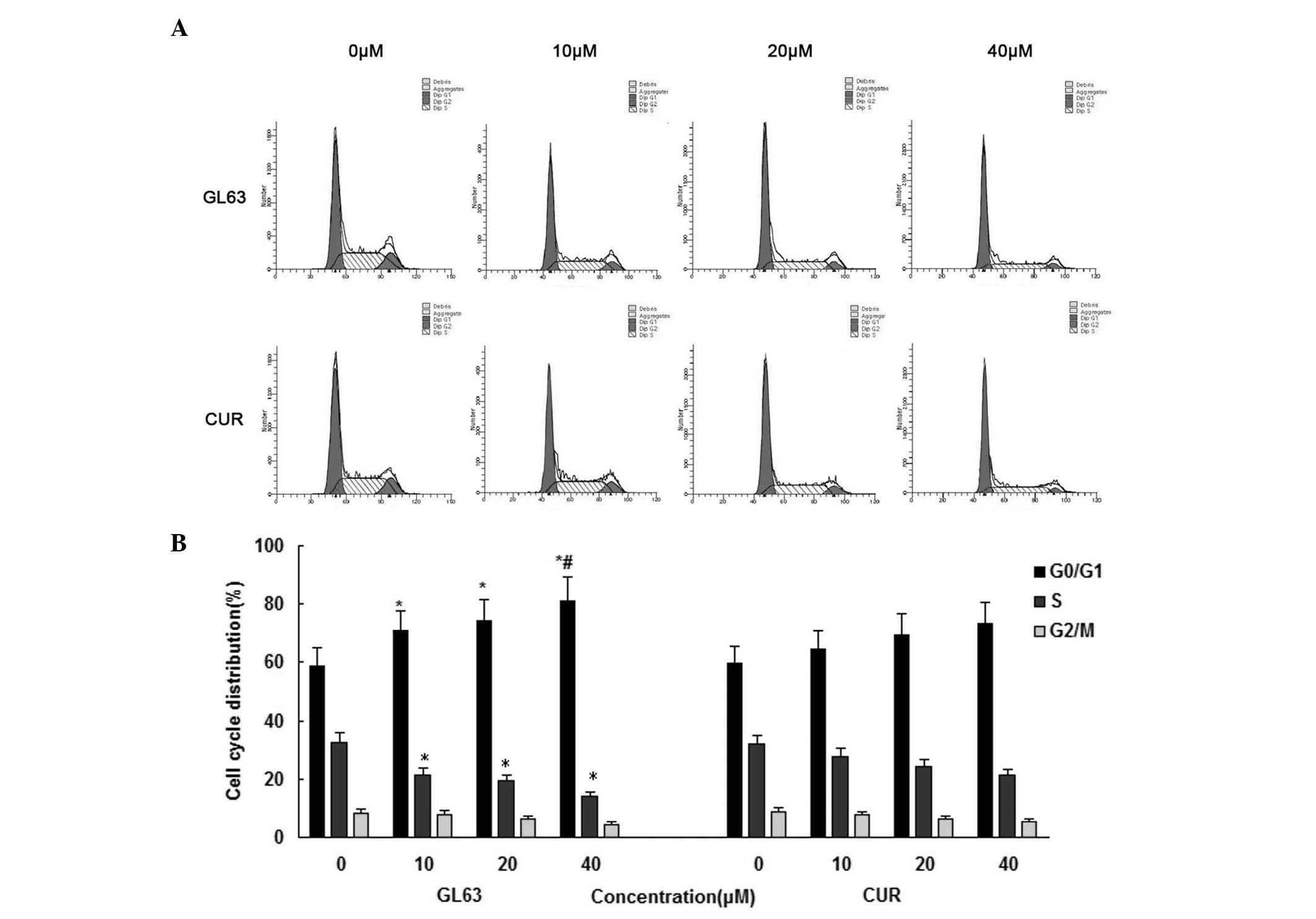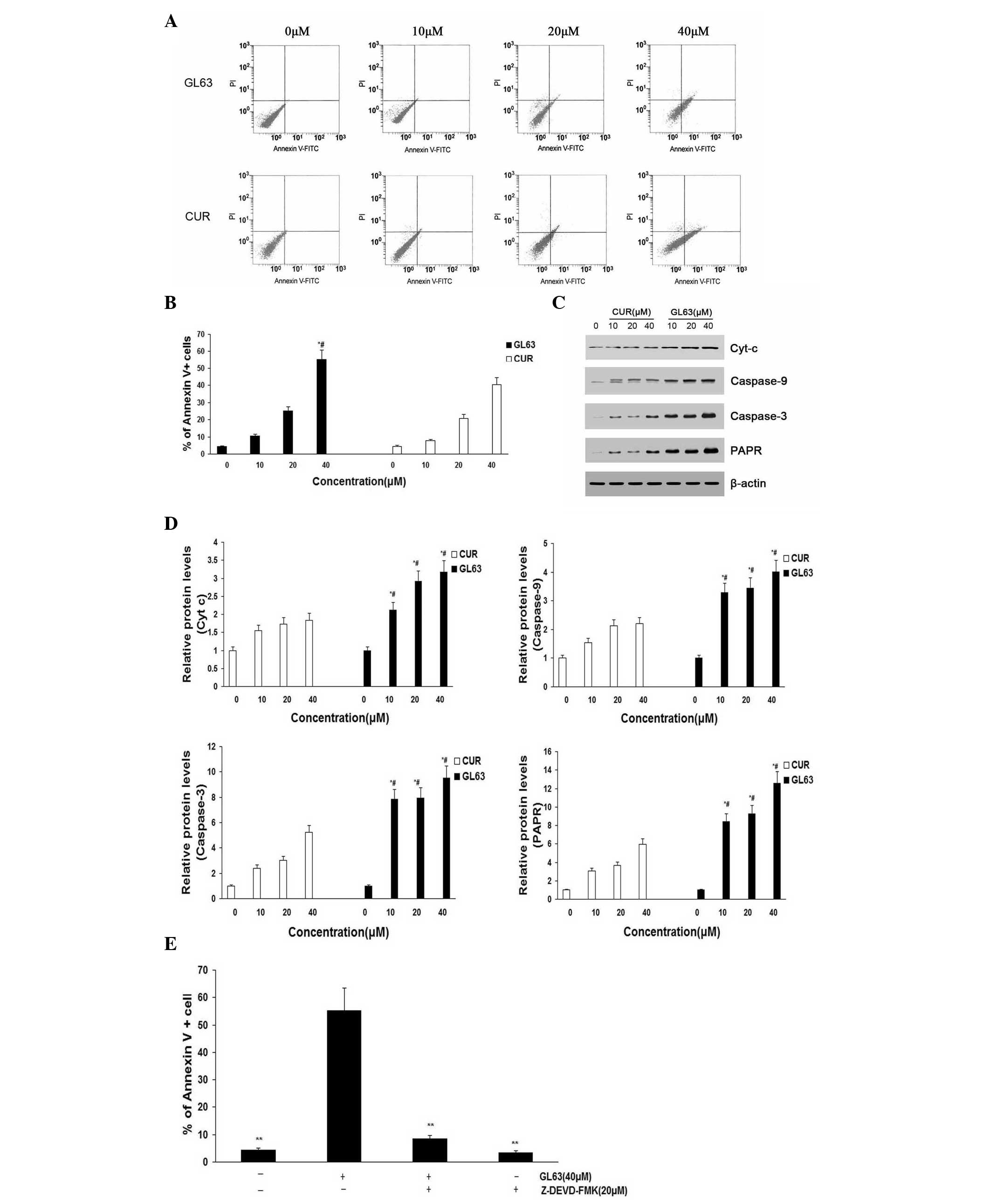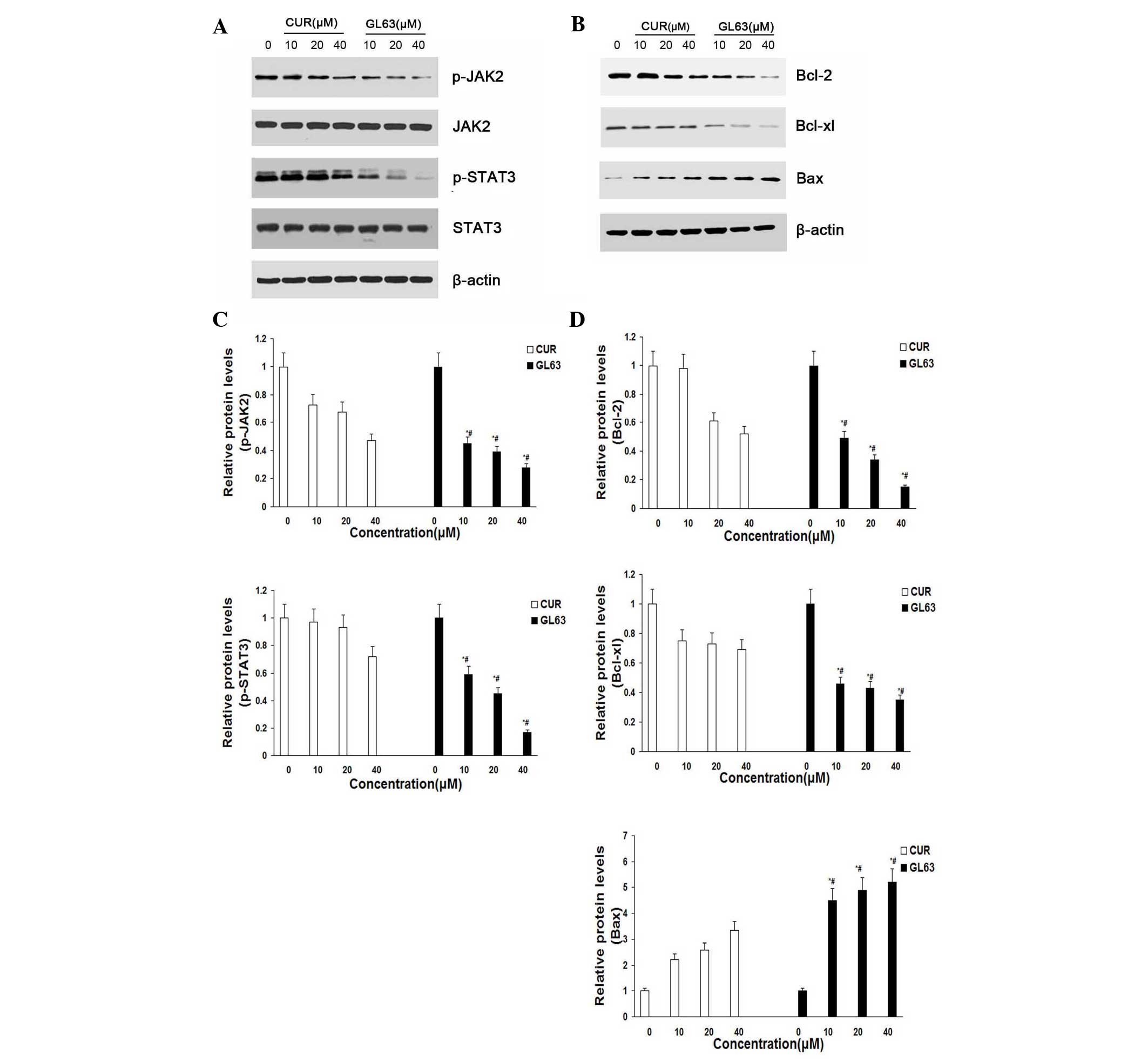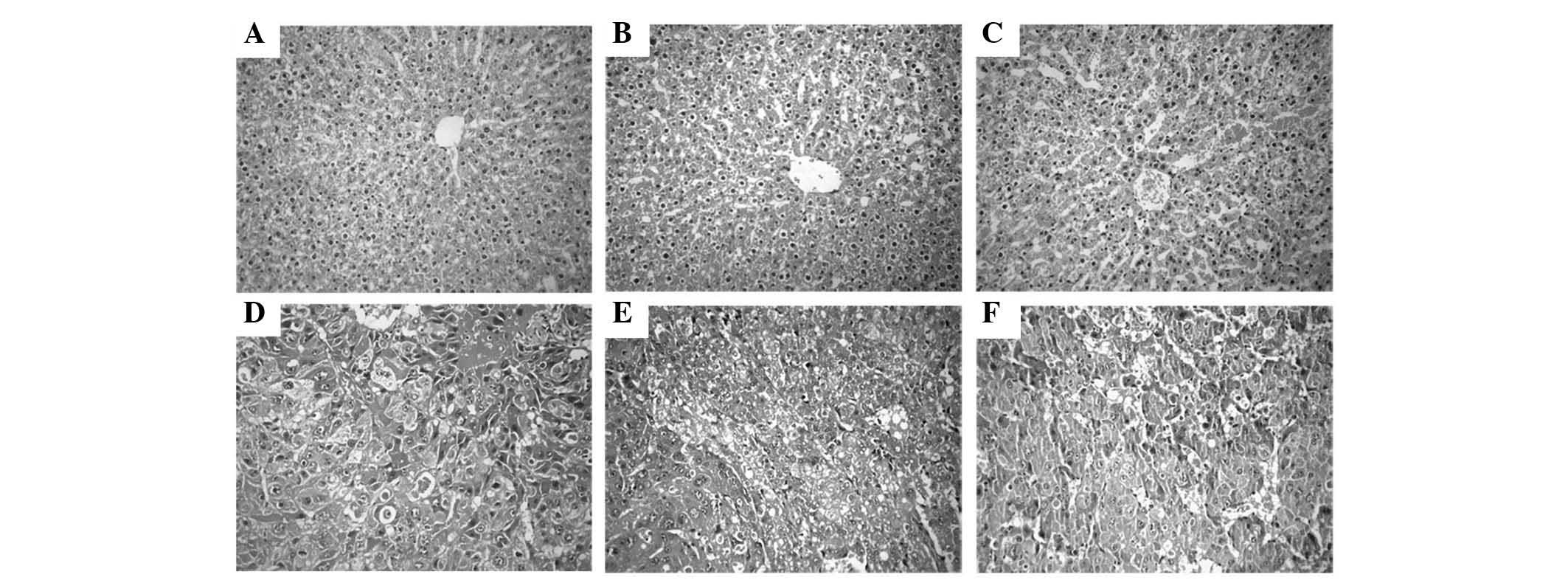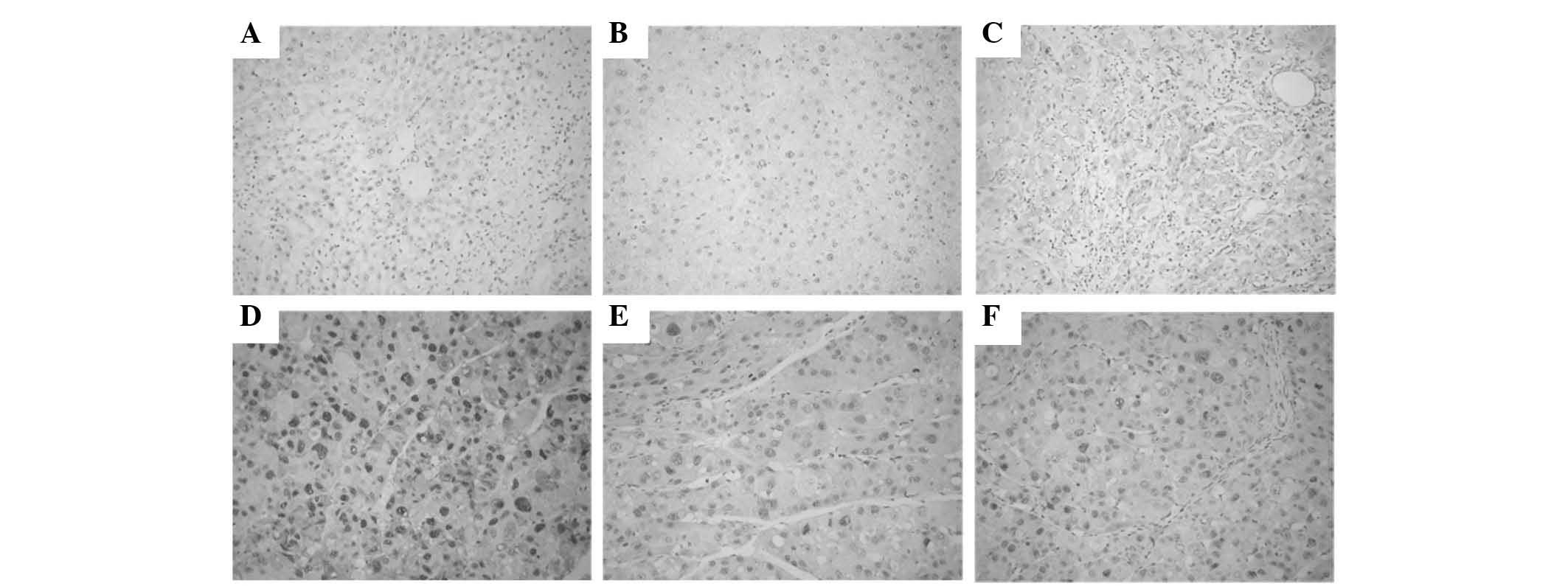|
1
|
Hussain SA, Ferry DR, El-Gazzaz G, Mirza
DF, James ND, McMaster P and Kerr DJ: Hepatocellular carcinoma. Ann
Oncol. 12:161–172. 2001. View Article : Google Scholar : PubMed/NCBI
|
|
2
|
Yang TS, Wang CH, Hsieh RK, Chen JS and
Fung MC: Gemcitabine and doxorubicin for the treatment of patients
with advanced hepatocellular carcinoma: A phase I–II trial. Ann
Oncol. 13:1771–1778. 2002. View Article : Google Scholar : PubMed/NCBI
|
|
3
|
Okuda H: Hepatocellular carcinoma
development in cirrhosis. Best Pract Res Clin Gastroenterol.
21:161–173. 2007. View Article : Google Scholar : PubMed/NCBI
|
|
4
|
Ikeda K: Current therapy for
hepatocellular carcinoma. Nihon Rinsho. 68:1129–1136. 2010.(In
Japanese). PubMed/NCBI
|
|
5
|
Zhao JA, Peng L, Geng CZ, Liu YP, Wang X,
Yang HC and Wang SJ: Preventive effect of hydrazinocurcumin on
carcinogenesis of diethylnitrosamine-induced hepatocarcinoma in
male SD Rats. Asian Pac J Cancer Prev. 15:2115–2121. 2014.
View Article : Google Scholar : PubMed/NCBI
|
|
6
|
Anand P, Sundaram C, Jhurani S,
Kunnumakkara AB and Aggarwal BB: Curcumin and cancer: An ‘old-age’
disease with an ‘age-old’ solution. Cancer Lett. 267:133–164. 2008.
View Article : Google Scholar : PubMed/NCBI
|
|
7
|
Dai XZ, Yin HT, Sun LF, Hu X, Zhou C, Zhou
Y, Zhang W, Huang XE and Li XC: Potential therapeutic efficacy of
curcumin in liver cancer. Asian Pac J Cancer Prev. 14:3855–3859.
2013. View Article : Google Scholar : PubMed/NCBI
|
|
8
|
Anand P, Kunnumakkara AB, Newman RA and
Aggarwal BB: Bioavailability of curcumin: Problems and promises.
Mol Pharm. 4:807–818. 2007. View Article : Google Scholar : PubMed/NCBI
|
|
9
|
Appiah-Opong R, de Esch I, Commandeur JN,
Andarini M and Vermeulen NP: Structure-activity relationships for
the inhibition of recombinant human cytochromes P450 by curcumin
analogues. Eur J Med Chem. 43:1621–1631. 2008. View Article : Google Scholar : PubMed/NCBI
|
|
10
|
Sharma RA, Steward WP and Gescher AJ:
Pharmacokinetics and pharmacodynamics of curcumin. Adv Exp Med
Biol. 595:453–470. 2007. View Article : Google Scholar : PubMed/NCBI
|
|
11
|
Padhye S, Chavan D, Pandey S, Deshpande J,
Swamy KV and Sarkar FH: Perspectives on chemopreventive and
therapeutic potential of curcumin analogs in medicinal chemistry.
Mini Rev Med Chem. 10:372–387. 2010. View Article : Google Scholar : PubMed/NCBI
|
|
12
|
Agrawal DK and Mishra PK: Curcumin and its
analogues: Potential anticancer agents. Med Res Rev. 30:818–860.
2010.PubMed/NCBI
|
|
13
|
Liang G, Yang SL, Shao LL, Zhao CG, Xiao
J, Lv YX, Yang J, Zhao Y and Li XK: Synthesis, structure, and
bioevaluation of 2,5-bis(arylmethenyl)cyclopentanones. J Asian Nat
Prod Res. 10:957–965. 2008. View Article : Google Scholar : PubMed/NCBI
|
|
14
|
Liang G, Yang S, Zhou H, Shao L, Huang K,
Xiao J, Huang Z and Li X: Synthesis, crystal structure and
anti-inflammatory properties of curcumin analogues. Eur J Med Chem.
44:915–919. 2009. View Article : Google Scholar : PubMed/NCBI
|
|
15
|
Liang G, Yang S, Jiang L, Zhao Y, Shao L,
Xiao J, Ye F, Li Y and Li X: Synthesis and anti-bacterial
properties of mono-carbonyl analogues of curcumin. Chem Pharm Bull
(Tokyo). 56:162–167. 2008. View Article : Google Scholar : PubMed/NCBI
|
|
16
|
Robinson TP, Ehlers T, Hubbard RB IV, Bai
X, Arbiser JL, Goldsmith DJ and Bowen JP: Design, synthesis, and
biological evaluation of angiogenesis inhibitors: Aromatic enone
and dienone analogues of curcumin. Bioorg Med Chem Lett.
13:115–117. 2003. View Article : Google Scholar : PubMed/NCBI
|
|
17
|
Ohtsu H, Xiao Z, Ishida J, Nagai M, Wang
HK, Itokawa H, Su CY, Shih C, Chiang T, Chang E, et al: Antitumor
agents. 217. Curcumin analogues as novel androgen receptor
antagonists with potential as anti-prostate cancer agents. J Med
Chem. 45:5037–5042. 2002. View Article : Google Scholar : PubMed/NCBI
|
|
18
|
Weng Q, Fu L, Chen G, Hui J, Song J, Feng
J, Shi D, Cai Y, Ji J and Liang G: Design, synthesis, and
anticancer evaluation of long-chain alkoxylated mono-carbonyl
analogues of curcumin. Eur J Med Chem. 103:44–55. 2015. View Article : Google Scholar : PubMed/NCBI
|
|
19
|
Xiao J, Tan Y, Pan Y, Liang G, Qu C, Zhang
X, Zhang Y, Li X and Yang H: A new cyclooxygenase-2 inhibitor,
(1E,4E)-1,5-bis(2-bromophenyl)penta-1,4-dien-3-one (GL63)
suppresses cyclooxygenase-2 gene expression in human lung
epithelial cancer cells: Coupled mRNA stabilization and
posttranscriptional inhibition. Biol Pharm Bull. 33:1170–1175.
2010. View Article : Google Scholar : PubMed/NCBI
|
|
20
|
Liang G, Shao L, Wang Y, Zhao C, Chu Y,
Xiao J, Zhao Y, Li X and Yang S: Exploration and synthesis of
curcumin analogues with improved structural stability both in vitro
and in vivo as cytotoxic agents. Bioorg Med Chem. 17:2623–2631.
2009. View Article : Google Scholar : PubMed/NCBI
|
|
21
|
Xiao J, Chu Y, Hu K, Wan J, Huang Y, Jiang
C, Liang G and Li X: Synthesis and biological analysis of a new
curcumin analogue for enhanced anti-tumor activity in HepG 2 cells.
Oncol Rep. 23:1435–1441. 2010.PubMed/NCBI
|
|
22
|
Pan Y, Xiao J, Liang G, Wang M, Wang D,
Wang S and Yang H: A new curcumin analogue exhibits enhanced
antitumor activity in nasopharyngeal carcinoma. Oncol Rep.
30:239–245. 2013.PubMed/NCBI
|
|
23
|
Reiser D: Animal EthicsEncylopedia of
Corporate Social Responsibility. Springer; Berlin Heidelberg: pp.
106–110. 2013
|
|
24
|
Theise ND, Curado MP and Franceschi S:
Hepatocellular carcinomaWHO Classification of Tumors of the
Digestive System. Bosman FT, Carneiro F, Hruban RH and Theise ND:
4th. IARC Press; Lyon: pp. 205–216. 2010
|
|
25
|
Porter AG and Jänicke RU: Emerging roles
of caspase-3 in apoptosis. Cell Death Differ. 6:99–104. 1999.
View Article : Google Scholar : PubMed/NCBI
|
|
26
|
Taras D, Blanc JF, Rullier A, Dugot-Senant
N, Laurendeau I, Vidaud M and Rosenbaum J: Pravastatin reduces lung
metastasis of rat hepatocellular carcinoma via a coordinated
decrease of MMP expression and activity. J Hepatol. 46:69–76. 2007.
View Article : Google Scholar : PubMed/NCBI
|
|
27
|
Franco-Bourland RE and Méndez-Sánchez N:
The liver is the key organ for the development of metabolic
syndrome. Ann Hepatol. 10:216–217. 2011.PubMed/NCBI
|
|
28
|
Peraino C: Initiation and promotion of
liver tumorigenesis. Natl Cancer Inst Monogr. 58:55–61.
1981.PubMed/NCBI
|
|
29
|
Sivalokanathan S, Ilayaraja M and
Balasubramanian MP: Antioxidant activity of Terminalia arjuna bark
extract on N-nitrosodiethylamine induced hepatocellular carcinoma
in rats. Mol Cell Biochem. 281:87–93. 2006. View Article : Google Scholar : PubMed/NCBI
|
|
30
|
Pereira MA, Herren-Freund SL, Britt AL and
Khoury MM: Effect of coadministration of phenobarbital sodium on
N-nitrosodiethylamine-induced gamma-glutamyltransferase-positive
foci and hepatocellular carcinoma in rats. J Natl Cancer Inst.
72:741–744. 1984.PubMed/NCBI
|
|
31
|
Fen F, Pascale RM, Simile MM, De Miglio
MR, Muroni MR and Calvisi D: Genetic alterations in liver
carcinogenesis: Implications for new preventive and therapeutic
strategies. Crit Rev Oncog. 11:19–62. 2000.PubMed/NCBI
|
|
32
|
Al-Rejaie SS, Aleisa AM, Al-Yahya AA,
Bakheet SA, Alsheikh A, Fatani AG, Al-Shabanah OA and Sayed-Ahmed
MM: Progression of diethylnitrosamine-induced hepatic
carcinogenesis in carnitine-depleted rats. World J Gastroenterol.
15:1373–1380. 2009. View Article : Google Scholar : PubMed/NCBI
|
|
33
|
Verna L, Whysner J and Williams GM:
N-nitrosodiethylamine mechanistic data and risk assessment:
Bioactivation, DNA-adduct formation, mutagenicity, and tumor
initiation. Pharmacol Ther. 71:57–81. 1996. View Article : Google Scholar : PubMed/NCBI
|
|
34
|
Granado-Serrano AB, Martín MA, Bravo L,
Goya L and Ramos S: A diet rich in cocoa attenuates
N-nitrosodiethylamine-induced liver injury in rats. Food Chem
Toxicol. 47:2499–2506. 2009. View Article : Google Scholar : PubMed/NCBI
|
|
35
|
Sreepriya M and Bali G: Chemopreventive
effects of embelin and curcumin against
N-nitrosodiethylamine/phenobarbital-induced hepatocarcinogenesis in
Wistar rats. Fitoterapia. 76:549–555. 2005. View Article : Google Scholar : PubMed/NCBI
|
|
36
|
Sivaramakrishnan V, Shilpa PN, Kumar VR
Praveen and Devaraj S Niranjali: Attenuation of
N-nitrosodiethylamine-induced hepatocellular carcinoma by a novel
flavonol-Morin. Chem Biol Interact. 171:79–88. 2008. View Article : Google Scholar : PubMed/NCBI
|
|
37
|
Kelloff GJ, Lieberman R, Steele VE, Boone
CW, Lubet RA, Kopelovitch L, Malone WA, Crowell JA and Sigman CC:
Chemoprevention of prostate cancer: Concepts and strategies. Eur
Urol. 35:342–350. 1999. View Article : Google Scholar : PubMed/NCBI
|
|
38
|
Schindler CW: Series introduction.
JAK-STAT signaling in human disease. J Clin Invest. 109:1133–1137.
2002. View Article : Google Scholar : PubMed/NCBI
|
|
39
|
Mitchell TJ and John S: Signal transducer
and activator of transcription (STAT) signalling and T-cell
lymphomas. Immunology. 114:301–312. 2005. View Article : Google Scholar : PubMed/NCBI
|
|
40
|
Liu Y, Wang L, Wu Y, Lv C, Li X, Cao X,
Yang M, Feng D and Luo Z: Pterostilbene exerts antitumor activity
against human osteosarcoma cells by inhibiting the JAK2/STAT3
signaling pathway. Toxicology. 304:120–131. 2013. View Article : Google Scholar : PubMed/NCBI
|
|
41
|
Wung BS, Hsu MC, Wu CC and Hsieh CW:
Resveratrol suppresses IL-6-induced ICAM-1 gene expression in
endothelial cells: Effects on the inhibition of STAT3
phosphorylation. Life Sci. 78:389–397. 2005. View Article : Google Scholar : PubMed/NCBI
|
|
42
|
Du W, Hong J, Wang YC, Zhang YJ, Wang P,
Su WY, Lin YW, Lu R, Zou WP, Xiong H and Fang JY: Inhibition of
JAK2/STAT3 signalling induces colorectal cancer cell apoptosis via
mitochondrial pathway. J Cell Mol Med. 16:1878–1888. 2012.
View Article : Google Scholar : PubMed/NCBI
|
|
43
|
Gross A, McDonnell JM and Korsmeyer SJ:
BCL-2 family members and the mitochondria in apoptosis. Genes Dev.
13:1899–1911. 1999. View Article : Google Scholar : PubMed/NCBI
|
|
44
|
Granado-Serrano AB, Martín MA, Bravo L,
Goya L and Ramos S: Quercetin induces apoptosis via caspase
activation, regulation of Bcl-2, and inhibition of PI-3-kinase/Akt
and ERK pathways in a human hepatoma cell line (HepG2). J Nutr.
136:2715–2721. 2006.PubMed/NCBI
|
|
45
|
Estaquier J, Vallette E, Vayssiere JL and
Mignotte B: The mitochondrial pathways of apoptosis. Adv Exp Med
Biol. 942:157–183. 2012. View Article : Google Scholar : PubMed/NCBI
|
|
46
|
Martin KR: Targeting apoptosis with
dietary bioactive agents. Exp Biol Med (Maywood). 231:117–129.
2006.PubMed/NCBI
|
|
47
|
Würstle ML, Laussmann MA and Rehm M: The
central role of initiator caspase-9 in apoptosis signal
transduction and the regulation of its activation and activity on
the apoptosome. Exp Cell Res. 318:1213–1220. 2012. View Article : Google Scholar : PubMed/NCBI
|
|
48
|
Fuke H, Shiraki K, Sugimoto K, Tanaka J,
Beppu T, Yoneda K, Yamamoto N, Ito K, Masuya M and Takei Y: Jak
inhibitor induces S phase cell-cycle arrest and augments
TRAIL-induced apoptosis in human hepatocellular carcinoma cells.
Biochem Biophys Res Commun. 363:738–744. 2007. View Article : Google Scholar : PubMed/NCBI
|
|
49
|
Park DH, Shin JW, Park SK, Seo JN, Li L,
Jang JJ and Lee MJ: Diethylnitrosamine (DEN) induces irreversible
hepatocellular carcinogenesis through overexpression of G1/S-phase
regulatory proteins in rat. Toxicol Lett. 191:321–326. 2009.
View Article : Google Scholar : PubMed/NCBI
|
















